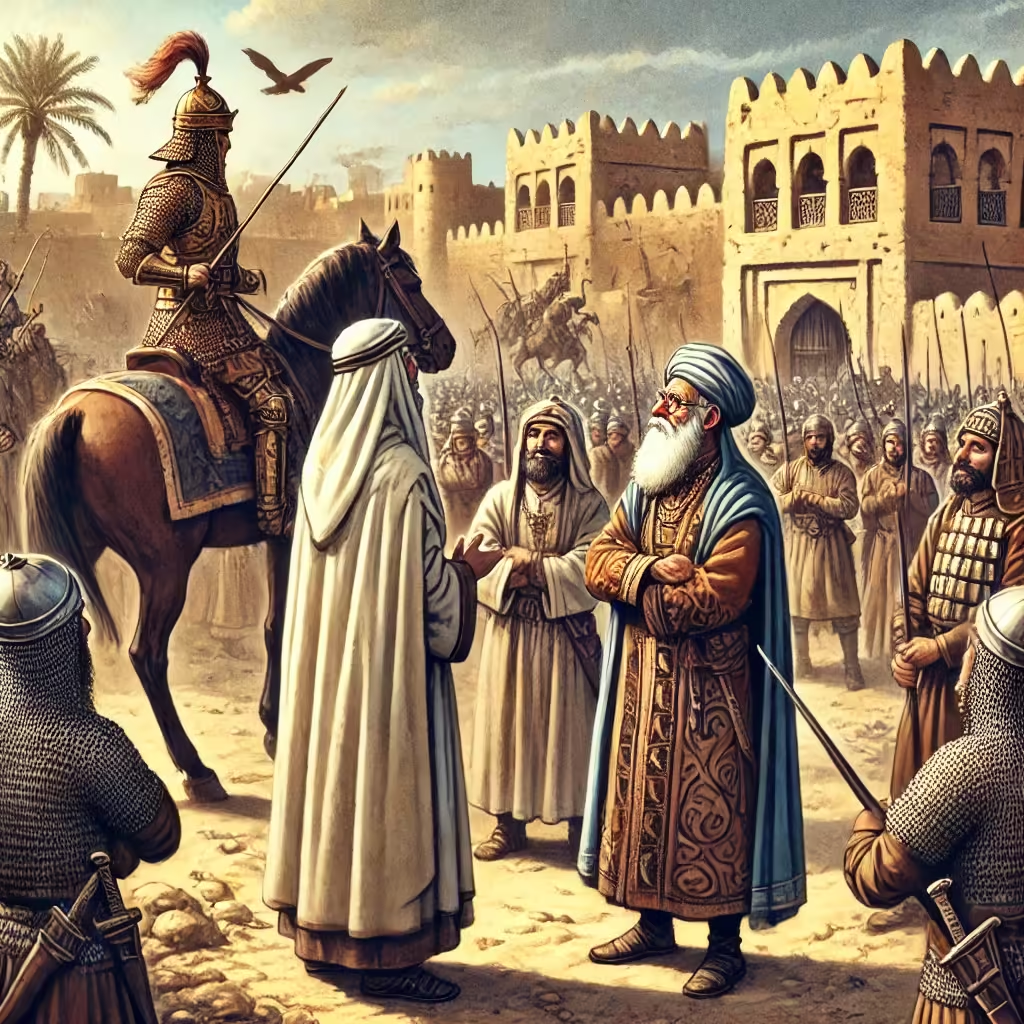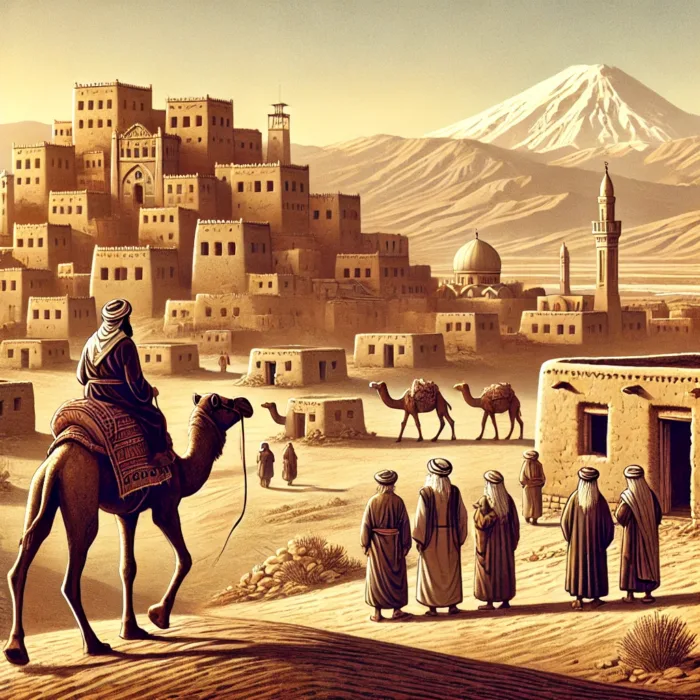Table of Contents
Introduction
This is the four part in a series of articles on “Lessons from Hijrah“. You can click here to read the full series, ALLAH willing.
In this article, we address the following questions:
- How did the Prophet (Peace be upon Him) first learn that He would migrate?
- How was the news of the Hijrah (migration) known even before the Prophet (Peace be upon Him) Himself became aware of it?
- Who were the individuals who aligned their political affairs and migration plans with the Prophet’s Hijrah (migration) before He had even embarked on it?
The Significance of the Hijrah (migration) in Previous Scriptures
In the previous three articles, we explored the significance of having a state, governance, and authority for anyone with a mission, particularly highlighting how Islam cannot flourish without these pillars. In this article, we will take a thoughtful and reflective look at the concept of Hijrah (migration). The Hijrah marked a monumental transition, shifting from simply delivering the message to establishing a state. This event was so pivotal that it was foretold in earlier scriptures, which prophesied the arrival of Prophet Muhammad (Peace be upon Him).
The Prophet Muhammad (Peace be upon Him) was foretold by earlier prophets. In a hadith, the Prophet himself said,
“I am the supplication of my father Abraham, and the glad tidings of Jesus, son of Mary“1
This illustrates that previous prophets shared glad tidings of His coming, as confirmed in several Hadiths.
The inclusion of the Hijrah in the descriptions of the Prophet (Peace be upon Him) further underscores its profound importance and significance.
When Did the Prophet Know He Would Migrate?
The Prophet (Peace be upon Him) first learned about His forthcoming migration when He had a conversation with Waraqah ibn Nawfal, the cousin of Lady Khadijah (may ALLAH be pleased with Her). Waraqah had embraced Christianity during the pre-Islamic period and was well-versed in Christian scriptures. He had also studied Hebrew and had delved into the texts of both the Jews and Christians, eagerly awaiting the arrival of a prophet in his time. In fact, Waraqah even wrote famous poetry2 about this anticipation, which is preserved in the books of Seerah (Prophetic biography).
When Lady Khadijah (may ALLAH be pleased with Her) heard about the Prophet’s (Peace be upon Him) experience in the Cave of Hira, She took Him to her cousin, Waraqah ibn Nawfal. Waraqah asked,
“O my nephew! what did you see?”
After the Prophet shared His experience, Waraqah responded with great certainty,
“It is namus (the Angel Gabriel) that ALLAH sent down to Musa. Would that I were then (during your prophetic career) a young man. Would that I might be alive when Your people would expel You!”
The Messenger of ALLAH (Peace be upon Him), surprised, asked,
“Will they drive Me out?“
Waraqah answered,
“Yes. Never came a man with a like of what You have brought but met hostilities…”3
This encounter highlights that Waraqah was aware of the Prophet’s future migration even before the Prophet (Peace be upon Him) Himself realized it.
Knowledge of the Hijrah Before Waraqah ibn Nawfal
Even before Waraqah’s time, there were prophecies foretelling the Prophet’s migration. According to Ibn Hisham in the Seerah, the people of Yathrib (later known as Medinah) had a dispute with Tubba’, a king of Yemen. During this conflict, a man from Yathrib had killed one of Tubba’s men, prompting Tubba’ to prepare for an invasion of the city. Before he could proceed, two Jewish scholars from the tribe of Banu Qurayza approached him and warned, “O king, do not attempt this. If you do, you will be stopped”. Tubba’ asked, “Why?” They replied, “This city is destined to be the place of migration for a prophet whom ALLAH will send from the Sacred Land”.

This exchange shows that the Jews were aware that Yathrib was foretold to be the future home of the prophet, who would come from the Sacred Land (Mecca).
The Jews Settling in Medinah
This also highlights that, when the Jews were expelled from Jerusalem and the Levant by the Persians, some chose to settle in Medinah. Several Jewish tribes, including the major ones—Banu Qaynuqa’, Banu Nadir, and Banu Qurayza—established themselves in the city. Their presence in Medinah, along with their warnings to the people of Medinah and the surrounding Arab communities, showed their awareness of the Prophet’s future migration. They would say things like, “Soon, the Chosen One will be sent among us, and we will destroy you as ‘Ad was destroyed”.
These statements further demonstrate that the Jews had knowledge of the coming of the Prophet and His eventual migration to Medinah.
Prophecies in Ancient Hindu Scriptures
One area that has not been extensively explored is the mention of Prophet Muhammad (Peace be upon Him) in the prophecies of ancient Hindu scriptures. Although I have mentioned this before, it feels important to bring it up again. In particular, I referenced the book And Indeed, You Are of a Great Moral Character, a three-volume work supervised by Sheikh Safiur Rahman Mubarakpuri (may ALLAH have mercy on him), the author of “The Sealed Nectar“. In the last 90 pages of the first volume, Sheikh Safiur Rahman discussed various prophecies concerning Prophet Muhammad (Peace be upon Him) found in ancient Hindu religious texts.

One such prophecy, found in the Atharva Veda, contains a verse that states:
“Listen to this, ye men, : Indeed, Nārāśaṃsa (relating to the praise of a man or men, laudatory, eulogistic4, or ‘Muhammad’ in this language) is praised and commended. We will protect that migrant from among sixty thousand and ninety enemies”5
This passage is significant as it points to the coming of a prophet, referred to as ‘the Praised One’, which closely aligns with the meaning of the name Muhammad.
Biblical References to the Hijrah
Similarly, in the Bible, there are verses that point to significant events related to the Hijrah. in Isaiah 42:11-12, it is mentioned:
“Let the wilderness and its towns raise their voices, let the settlements where Kedar lives rejoice. Let the people of Sela sing for joy; let them shout from mountaintops. Let them give glory to the LORD and proclaim HIS praise in the islands”6
In Isaiah 21:14, it states:
“Bring water for the thirsty; you who live in Tema, bring food for the fugitives”7
- Tema is a region near Medinah.
These references suggest that the Hijrah was foretold in the scriptures of the Jews and Christians, as well as in ancient Hindu texts. This highlights the monumental significance of the Hijrah, marking the transition of the Prophet’s mission from being a message spread through hearts and minds to becoming a lived reality in the establishment of a state.
Conclusion
In Part Five, ALLAH willing, we will continue by addressing the following questions:
- How does the Hijrah undertaken by the Prophet (Peace be upon Him) differ from the migrations we witness today?
- How did the Holy Qur’an convey the hardships and intensity of the Hijrah?
- Why do we no longer experience the same deep sense of meaning that the early emigrants felt?
- How has the word “Hijrah” evolved in our minds and hearts compared to how it resonated in the past?
Sources:
Mohamed Elhamy. دروس الهجرة | 4. مفاجأة: عرفوا أن النبي ﷺ سيهاجر قبل النبي نفسه | محمد إلهامي. YouTube Video.
- Sahih al-Jami ↩︎
- Poem of Waraqah ↩︎
- Sahih Muslim ↩︎
- Nārāśaṃsa Meaning ↩︎
- Atharva Veda, Kanda (book) 20, Sukta (hymn) 127 ↩︎
- New International Version ↩︎
- New International Version ↩︎

